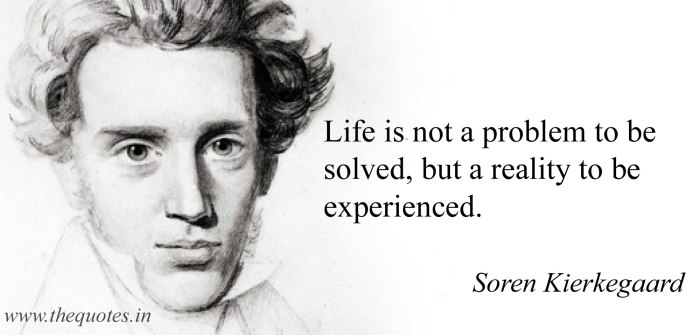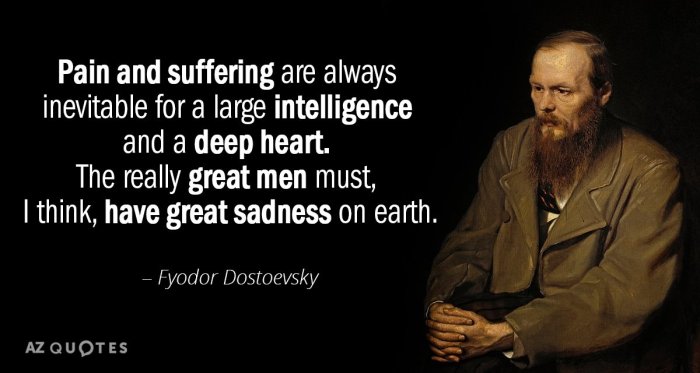
‘Baby, I’ve been waiting,
I’ve been waiting night and day
I didn’t see the time,
I waited half my life away
There were lots of invitations
And I know you sent me some
But I was waiting
For the miracle, for the miracle to come’
(Leonard Cohen)
Years ago, I read Samuel Beckett’s dirge Waiting For Godot. The book is about two homeless men sitting around talking about their experiences whilst they are waiting for Godot. The book is utterly tedious but maybe that is the point, to show how life happens whilst we are waiting for something that never comes and instead of waiting for the miracle/Godot we should focus on the day to day.
I recently read a new biography of the Danish philosopher Soren Kierkegaard. Whilst I was reading the book, with my previous knowledge of his work, I started to realise the paradox which is the life of Kierkegaard. Kierkegaard was concerned with how to live not only as a Christian but also as a person. He was engaged to be married but broke it off as he, in my opinion, could not reconcile the notion and reality of marriage. How would it impact his life? Would it consume him? Ironically it was the breaking of the engagement which consumed his whole life, not helped by seeing the lady whom he scorned in the streets and at church regularly. Whilst Kierkegaard thought long and hard about it, trying to find justifications for his actions (which he put into his writings) painting himself as being heartless or too devout etc., Regine overcame the public shamed of having her engagement broken and got married, or in other words, lived her life.
I know you really loved me
But, you see, my hands were tied
And I know it must have hurt you,
It must have hurt your pride
To have to stand beneath my window
With your bugle and your drum
And me I’m up there waiting
For the miracle, for the miracle to come
(Cohen)
And herein lies the paradox of the life of Kierkegaard. Whilst he was spending his time trying to understand what it would mean to live, to be alive, he was not living.
Advertising signs that con you
Into thinking you’re the one
That can do what’s never been done
That can win what’s never been won
Meantime life outside goes on
All around you
(Dylan)
The paradox of Kierkegaard, and many others who try to understand the phenomena which we call life, is that ‘I know it looks like I’m movin’ but I’m standin’ still’ (Dylan) or as Kafka, another one whom one might say spent too much time trying to understand life and not living it, said, to paraphrase, if life is a ladder mine is the stutter before the first rung, is that one might be ceasing one’s own life experience (‘You can withdraw from the sufferings of the world — that possibility is open to you and accords with your nature — but perhaps that withdrawal is the only suffering you might be able to avoid.’) and thusly not living.
Ah I don’t believe you’d like it,
You wouldn’t like it here
There ain’t no entertainment
And the judgments are severe
The Maestro says it’s Mozart
But it sounds like bubble gum
When you’re waiting
For the miracle, for the miracle to come
(Cohen)
One thought which played on Kierkegaard’s mind is that life is understood backwards, in that life happens and as we reflect upon what has just happened, we understand, or even recognise, our experiences and thus denote that we are alive/living/experiencing. And one, from a psychological, biological etc. viewpoint must see this as being undeniable and as Schopenhauer said:
‘What keeps all living things busy and in motion is the striving to exist. But when existence is secured, they do not know what to do: that is why the second thing that sets them in motion is a striving to get rid of the burden of existence, not to feel it any longer, ‘to kill time’, i.e. to escape boredom.’
Which again creates another paradox. If one is busy ‘becoming’ who they are then such things as holidays are not part of their lives as all of there energies are spent on trying to formulate one’s own existence. Once one reaches the level they desire/can manage then they settle down and cease ‘becoming’ in the active sense, ‘I know it looks like I’m movin’ but I’m standin’ still’, and when one stops becoming one starts to go and thus we have one of the greatest problems that has ever faced anyone (literally in the sense of the 19th + centuries when our lives have ceased to become a struggle just to survive) how to find the balance between being and living.
And to leave you with the words of Bob:
‘Pointed threats, they bluff with scorn
Suicide remarks are torn
From the fool’s gold mouthpiece
The hollow horn plays wasted words
Proves to warn that he not busy being born
Is busy dying’
‘till next time


